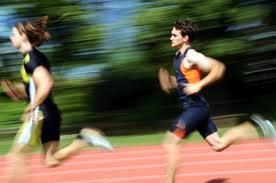Why do women like long distance runners? Don’t ask a woman; ask a biological anthropologist, specifically, a biological anthropologist at the University of Cambridge, where researchers think the reason is deep in our past: better runners make better hunters, and better hunters are nicer people. A University of Cambridge news release reports that researchers at the school studied marathon runners, using finger length as a marker for hormone exposure, and found that people who experienced higher testosterone in the womb are also better at distance running – a correlation particularly strong in men, although also present in women. So what? The researchers believe that the finding demonstrates that males with greater “reproductive potential†from an evolutionary standpoint are better distance runners and suggests that females may have selected for such athletic endurance when mating during our hunter-gatherer past, perhaps because ‘persistence hunting’ – exhausting prey by tirelessly tracking it – was a vital way to get food. Wait, there’s more. Because previous studies have shown that those exposed to more prenatal testosterone have a longer ring finger (4th digit) in comparison to their index finger (2nd digit), the researchers analyzed 542 runners (439 men; 103 women) at the Robin Hood half marathon in Nottingham by photocopying hands and taking run times and other key details just after runners crossed the line. The envelope please…They found that the 10 percent of men with the most masculine digit ratios were, on average, 24 minutes and 33 seconds faster than the 10 percent of men with the least masculine digit ratios. The correlation was also found in women, but was much more pronounced in men, suggesting a stronger evolutionary selection in men for running ability. The 10 percent of women with the most masculine digit ratios were, on average, 11 minutes and 59 seconds faster than the 10 percent with the least masculine.
reports that researchers at the school studied marathon runners, using finger length as a marker for hormone exposure, and found that people who experienced higher testosterone in the womb are also better at distance running – a correlation particularly strong in men, although also present in women. So what? The researchers believe that the finding demonstrates that males with greater “reproductive potential†from an evolutionary standpoint are better distance runners and suggests that females may have selected for such athletic endurance when mating during our hunter-gatherer past, perhaps because ‘persistence hunting’ – exhausting prey by tirelessly tracking it – was a vital way to get food. Wait, there’s more. Because previous studies have shown that those exposed to more prenatal testosterone have a longer ring finger (4th digit) in comparison to their index finger (2nd digit), the researchers analyzed 542 runners (439 men; 103 women) at the Robin Hood half marathon in Nottingham by photocopying hands and taking run times and other key details just after runners crossed the line. The envelope please…They found that the 10 percent of men with the most masculine digit ratios were, on average, 24 minutes and 33 seconds faster than the 10 percent of men with the least masculine digit ratios. The correlation was also found in women, but was much more pronounced in men, suggesting a stronger evolutionary selection in men for running ability. The 10 percent of women with the most masculine digit ratios were, on average, 11 minutes and 59 seconds faster than the 10 percent with the least masculine.
